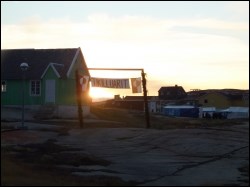Oqaatsut is situated approximately 18 km north of Ilulissat. With 40 inhabitants, Oqaatsut is the smallest of the settlements of Ilulissat. The settlement is also known as Rodebay, a name given to it by Dutch whalers. Even though the place had been inhabited since the 1700s – a settlement of the Inuit and a whaling station – it did not become a trading station until 1877. The settlement sits on a peninsula overlooking the icebergs in Disko Bay. The settlement still has an active role in whaling in the Ilulissat area since its location is very suited for drawing whales ashore. The Greenlandic name means “the cormorants”.
The main sources of income in Oqaatsut are fishing, sealing and whaling, supplemented by tourism.

Provisions and subareas
The general provisions apply to all subareas of the municipalities in towns, settlements and open country areas. The provisions are general and do not consider the local conditions in the subareas.
General provisions of the Town Plan
The overall provisions for each subarea are the basis for the municipality"s granting of area allotments and building permits.
The present service level and housing supply in Oqaatsut is to be adapted to the population trend and business opportunities. The objective is to develop and strengthen the fishing and tourism sectors through active cooperation with Ilulissat. Thought should also be given to the future location and management of the dump and an incineration plant. In addition, the physical settings are to provide adequate facilities for the activities of associations and for strengthening social cohesion in the settlement.
The population in Oqaatsut has been more than halved since 1980 (85) and in 2017 counts 37 people. However, with the establishment of Rodebay Fish in 2000, the negative population trend stopped, and population is expected to remain stable in the future. Against this background, replacement buildings are the main requirement of the present planning period.
All houses in Oqaatsut are detached, 1½-storey single-family houses painted in traditional Greenlandic colours. Some of the houses are only used intermittently, which affects the settlement to some degree.
In the town plan, the remaining capacity in Oqaatsut is estimated to approximately 65 homes.
Fishing continue to dominate activities in Oqaatsut, not least due to the local take-over of the Royal Greenland’s trading facilities and fish processing plant in 2000 and the foundation of Rodebay Fish. The factory processes Greenland halibut and cod mainly for the home market and employs up to ten people in the peak season.
The location of the settlement near Ilulissat attracts a number of tourists that go on boat trips, hiking or dog sledge riding. During visits, tourists can taste local Greenlandic specialties and experience the fishing, sealing and whaling life.
Naalakkersuisut has designated a smaller area next to Qqaatsut Harbor as a port authority area, which also includes a piece of the port's land area.
The majority of jobs in the settlement are at Rodebay Fish, but the tourism and service sectors, the all-purpose shop (KNI shop), the school and municipal functions also offer work to a number of people. Overall, employment in the settlements of Ilulissat has declined since 2010. The four settlements in the Ilulissat district had a total unemployment rate of 6.7% in 2015, which is lower than for Ilulissat (7.7%). Both Ilulissat and Uummannaq municipalities have a total unemployment rate of 6.7%, which is Avannaata Kommunia's lowest, and thus also slightly lower than the municipal average (9.1%). The unemployment rate in the settlements of the Ilulissat district is also somewhat lower than the national average (9.1%).
In the town plan, the remaining capacity for industry and port facilities in Oqaatsut is estimated to approximately 1,000 m².
Straight northwest of the port area, there is a private helistop; however, without air connection. Transport is by boat, dog sledge or snowmobile, primarily to Ilulissat. The settlement has no interconnected system of roads: There are a number of small, unconnected sections consisting of tracks or paths.
There are no sewerage facilities in the settlement. Waste and night soil are deposited in the dump approximately 500 metres northwest of the settlement. Water is supplied from desalination plants and is collected from bottling houses. The power plant and the gas station are located in the port. Houses in the settlement are heated by independent oil-fired burners. Nukissiorfiit is responsible for overall technical operations.
TELE Greenland A/S handles telecommunications.
The settlement has a school chapel, which is used both as a church and as a school (Oqaatsut Atuarfiat) for the five pupils in the settlement. After the first seven years of schooling, pupils are transferred to schools in Ilulissat. There is a nursing station, a community workshop and an all-purpose shop (KNI shop). Family day care is the only childcare option.
The school chapel provides the framework for the cultural life of the settlement. In addition, the sea and surrounding nature offer ample opportunities for leisure and outdoors activities. People living in the settlement also use the facilities in Ilulissat.
The oldest buildings in Oqaatsut are situated in the innermost part of the bay. The following are preservation-worthy buildings: storehouse from 1894 (B-62), clerk’s office from 1898 (B-66), the former village hall from 1923 (B-111) and the old shop from 1923 (B-122). The cemetery is situated on the southern fringes of the settlement.




